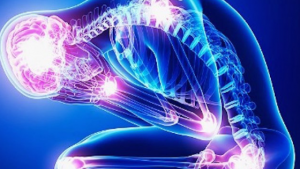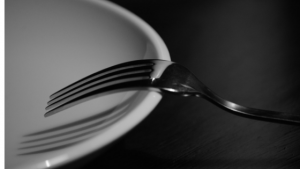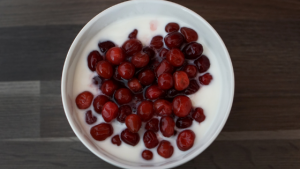
What if I told you there is one common link between almost all deadly diseases, including heart disease, cancer, stroke, and Alzheimer’s disease? And what if I told you that same link is also a key contributor to prostate problems, anxiety, depression, brain fog, moodiness, arthritis, allergies, and even gas?
That link exists, and it’s called chronic inflammation. Scientists are discovering with increasing certainty that most major illnesses and diseases are caused in some part by chronic inflammation in the body.
What is chronic inflammation?
Acute inflammation
You’ve likely met acute inflammation before. You sprain your ankle, and it swells up, turns red, and lets off heat—that’s inflammation. Even when you get a red, angry pimple filled with pus, that is an inflamed, infected skin pore.
Inflammation is the body’s natural response to something that has gone wrong in your body. Your body sends out white blood cells and cytokines, which are the “good guys” used to fight off infection and virus. Inflammation is the reaction when white blood cells take over and start to do their job. The process of inflammation gets rid of toxins and starts to repair damaged tissue.

Think of it this way. You’ve got some bad stuff going on in your body—whether it’s the flu virus or a broken ankle or bacteria on your face. Your body sends good stuff to fight the bad stuff. That “battle” between good and bad causes inflammation. So, inflammation is actually a good thing. It’s just a sign that the good stuff—the white blood cells—are doing their job and fighting to rid the body of the bad stuff.
Basically, inflammation is there to protect your body against infection or disease. It’s also the start of the healing process.
Chronic inflammation
Though this process is useful in the short-term, chronic long-term inflammation can have serious consequences. In the case of chronic inflammation, the white blood cells end up attacking the bad and the good in the body. Your white blood cells are sent to fight off some infection or virus, but then they stick around and start to attack your healthy tissues and organs as well. It’s an unfortunate case of “friendly fire” in the battle of your body.
Your body’s defensive mechanisms go rogue and start attacking everything in the body, good and bad.
Cytokines are pro-inflammatory proteins released by immune cells when the body detects some sort of injury or invasion. But, in chronic inflammation, the cytokines build up and don’t go away. These pro-inflammatory proteins start to inflame everything around them, which can actually worsen damage and disease.
Until the cytokines are eradicated, chronic inflammation can last indefinitely. Over time, the inflammation only continues to aggravate. The cytokines are inflaming your organs and tissues, which releases even more cytokines to the area to fight against the damage and injury. The immune system just can’t keep up with the influx of inflammation, and the entire system starts to break down.
Chronic inflammation is a deep-rooted, systemic problem that attacks at some of the most vital inner-workings of your system.

One of the most dangerous parts of chronic inflammation is that you can’t see or feel it happening. It is the silent killer, spurring a number of serious diseases. Chronic inflammation is most likely to attack your heart, brain, joints, belly, and immune system—the five processes that do the most to keep you alive and healthy.
What are the consequences of chronic inflammation?
Chronic inflammation can go undetected for years. In this case, inflammation is constantly assaulting your brain, heart, and immune system, progressively worsening and worsening over time. This can lead to serious and even fatal problems.
Heart disease and stroke
The inflammation actually damages blood vessels and leads to a plaque buildup in the arteries and brain. This will, at first, cause high blood pressure, hypertension, and a weakened heart. Over time, these inflammatory-related blockages can be fatal. In fact, some researchers have suggested that anti-inflammatory medications may help treat cardiovascular risk before severe damage is done.
Cancer
Inflammation can damage DNA and interrupt the body’s immune system processes. This, in turn, can cause tumors to form without any processes for self-destruction. Common inflammation-related cancers include lung, lymphoma, ovarian, pancreatic, and prostate cancer—the organs that commonly inflame easily. Colorectal cancer is also common, as chronic inflammation is also the cause of a number of bowel diseases like IBD, ulcerative colitis, and Chron’s disease.
Alzheimer’s disease
Alzheimer’s and other cognitive impairment (like dementia) is one of the most common consequences of chronic inflammation. Although the direct connection is still being worked out, studies have concluded that there is an activation of immune and inflammatory processes in cognitive disease. One study noted that drugs for cognitive decline often don’t work to stop or reverse the disease, likely because they don’t attack the underlying chronic inflammation; in fact, drugs for cognitive impairment may even make the inflammation in the brain worse.

Depression
Studies show that depression is linked to systemic, chronic inflammation. Brain scans of people with depression show that their brains have increased neuroinflammation, which causes depression, fatigue, brain fog, and impaired concentration.
Rheumatoid arthritis
Inflammation in the joints is the number one cause for rheumatoid arthritis, fibromyalgia, and macular degeneration. In fact, rheumatologists almost always look at the causes of inflammation first in order to find the appropriate ways to treat pain in their patients. This is usually the best cause of action for people who have suffered from this pain on a daily basis. For some people though, their pain may start out of nowwhere and may want to find a quick source of pain relief that can help relieve their symptoms. Some people could decide to turn to certain types of cannabis strains that are supposedly meant to help with a person’s pain. You can Visit website here for more information on this type of relief. However, there are many different types of options out there to help you, it’s all about finding the one that is effective for you and your pain.
Prostate disorders
Enlarged prostate and prostatitis are due to inflammation in the prostate gland. Studies have looked at the intimate link between inflammation and BPH as well as that of inflammation and prostate cancer.
Nephritis
Inflammation in the body will directly impact the kidneys, which are the body’s natural detoxifying organs. Any toxins in the body will be filtered through the kidneys; this causes nephritis (inflammation of the kidneys) and chronic kidney disease.
The same is true for pancreatitis, and anything that ends in –itis (like arthritis). The suffix –itis is the term used to describe the inflammation of something like sinusitis is the inflammation of the sinus.
The list of concerns with chronic inflammation goes on and on. Studies suggest chronic inflammation is also linked to:
- Asthma
- Allergies
- Diabetes
- Chronic lower respiratory disease
- Parkinson’s
- ADD
- Lupus
- Multiple sclerosis
- Migraines
As you can see, chronic inflammation can cause an umbrella of consequences. Interestingly, chronic inflammation tends to cause problems in those areas where you are genetically weakest or not taking care of yourself. So you may have full-body systemic inflammation, but it may only impact those areas where your body already has some sort of predisposed risk.
Chronic inflammation knocks you down at the knees and then hits you again while you’re down.
What are the symptoms of chronic inflammation?
Now you’re thinking, “do I have chronic inflammation?” And I’m glad you’re asking the question. Because understanding and acknowledging chronic inflammation is the first step in fighting against it and its associated diseases.
Unlike acute inflammation, you usually won’t be able to see the symptoms of chronic inflammation firsthand. It won’t cause your ankle to swell up or your infection to fill with pus. Chronic inflammation is a silent killer.

However, if you’re feeling symptoms of a weakened system, you may be dealing with chronic inflammation:
- Gut problems like heartburn, gas, nausea (inflamed gut)
- Overweight or obesity (fat fuels inflammation)
- Constant fatigue and insufficient sleep (lowered immune system)
- Prostate problems like BPH and prostatitis (inflamed sex organs)
- Stress, especially in the morning (a sign the immune system is working in overdrive)
- Mental fog or emotional instability (inflamed brain)
- High cholesterol and blood pressure (inflamed heart)
- Unexplained pains or weakness (inflamed joints and immune system)
If you feel generally unwell but can’t place why, you may have chronic inflammation.
What causes chronic inflammation?
So where does chronic inflammation come from? How do you know if you’re at risk?
1.Obesity
Being overweight and/or having diabetes is a proven cause of chronic inflammation. Diabetes and obesity are both linked to insulin resistance, which is when the body’s cells become less responsive to insulin. This means that cells fill up with glucose and the pancreas has to go into overdrive producing more insulin. This creates an excess of free-floating insulin, which in turn unbalances hormones and increases the body’s storage of fat.
Extra visceral belly fat sits around the organs in the abdomen. These fat cells actually pump out chemicals and proteins, like cytokines, interleukin-6, and tumor necrosis factor. These all provoke the inflammatory system, thus causing chronic inflammation. The more fat you have on your body, the more pro-inflammatory chemicals sent out.
2. Stress
One of the most prominent causes of chronic inflammation is stress. We’ve known for years that stress wreaks havoc on your system, but we weren’t always sure exactly how. Recent studies have shown that the body’s stress response actually impairs its ability to regulate inflammation. Participants who were stressed were unable to fight off infection as quickly and had a higher inflammatory response than non-stressed participants.
Moreover, stress causes high levels of cortisol. Cortisol lowers testosterone, diminishes the immune system, and negatively affects insulin levels (which we discussed under “obesity”). Basically, more stress leads to more inflammation.
3. Diet
The foods you are eating could be contributing to or causing your chronic inflammation as well. Some foods are actually pro-inflammatory, like sugars, saturated fats, trans fats, gluten, MSG, and processed or packaged foods. Alcohol in high amounts is also a cause of inflammation.
4. Toxins
Moreover, if you’re eating processed foods, you could be exposing yourself to pesticides and hormones. Chemicals negatively impact our immune system and cause inflammation. Toxins in the air or in your environment can also be stimulating this response. Toxins are found most prominently in glues, adhesives, plastics, air fresheners, cleaning products, pollution, and heavy metals.
5. Smoking
Cigarettes are filled with toxins that will cause inflammation. The chemicals in these cigarettes attack your immune system and release high amounts of cytokines that your body can’t regulate.
6. Periodontal Disease
Interestingly, periodontal disease is linked to systemic inflammation. When you have any sort of inflammatory disease, it can seep out into your other bodily systems. Since the mouth is so close to the brain, heart, and kidney, periodontal disease can do surprisingly severe damage to your crucial functions. Smoking often causes periodontal disease as well.
7. Hormones
If your hormones are unbalanced, your body gets thrown out of whack. Low testosterone levels specifically contribute to chronic inflammation, which is why men with low T often feel brain fog, aches and pains, and a disinterest in what they once found enjoyable. Learn more about regulating hormones here.
8. Sleep
Your body resets itself during sleep. If you don’t sleep consistently or have disrupted sleep, your body thinks something is wrong. It will release pro-inflammatory factors like tumor necrosis factor-alpha and interleukin-6 to fight against what it thinks is something invading your body. When those factors have nothing to fight, they’ll hang around and do damage to your healthy organs—aka chronic inflammation.
9. Aging
As we age, our body can’t fight off infection as easily. This means our body overcompensates with high amounts of inflammation to fight off daily toxins and stressors. Our aging body then can’t fight off the inflammation as well either, causing a vicious cycle of illness and inflammation.
10. Genes
Some people have a genetic predisposition to certain inflammatory concerns. As discussed, inflammation likes to hit you where it already hurts—like in genetic weaknesses or soft spots.
But this doesn’t mean that chronic inflammation is inevitable just because you’re getting older, it’s in your genes, or you feel stress every once in a while.
Do YOU have chronic inflammation?
Image Source: http://content.time.com/time/covers/0,16641,20040223,00.html
We have no idea how many people are suffering from chronic inflammation. It’s likely that anyone with any sort of disease or illness is dealing with some sort of inflammation. Inflammation is the body’s healing response; so, if you need healing, your body is going to send out some sort of inflammatory response. If you need healing but aren’t getting better, likely that inflammatory response has gone rogue.
If you have any of the above symptoms and/or you’re at risk for chronic inflammation with the above causes, then it’s time to consult a doctor. Your doctor can run blood tests for inflammation, like the C-reactive protein test or fibrinogen test. There are also more expensive tests that look at your cytokine levels to determine inflammation intensity.
But it’s important to note that you could have low-grade inflammation that still goes undetected. Often, chronic inflammation isn’t considered until it causes severe cellular damage that results in another disease, like Alzheimer’s or heart disease.
A good rule of thumb: always take care of yourself as if you had chronic inflammation.
How can you reduce chronic inflammation?
In most cases, chronic inflammation can be treated with lifestyle changes and healthy living. This means that whether or not you have diagnosed chronic inflammation, you can make these changes to reduce your risk and start feeling better.
So what can you do to reduce your chronic inflammation and threat of associated diseases?
1. Avoid inflammatory foods.
Most Americans eat a pro-inflammatory diet, which contributes heavily to chronic inflammation. Unhealthy meals are directly linked to stress, negative emotions, and long-term disease. Inflammatory foods include:
- Fried foods (trans fats)
- Soda (sugar)
- Refined carbohydrates
- Red meat
- Processed meat
- Margarine
- Processed foods (preservatives and chemicals)
Gluten is also highly inflammatory. Gluten irritates the intestinal wall and actually makes the large intestine porous and open. This can contribute to “leaky gut,” which is when substances leak out of the intestinal tract and into the bloodstream and lymph system. Yes, the toxins you’re supposed to poop out find their way back into your central system.
Try cutting gluten from your diet for 4-6 weeks. Reintroduce one gluten item for a week to see how your body reacts. If you suddenly feel anxiety, fatigue, and gastrointestinal problems when you reintroduce gluten, you know that you need to cut the inflammatory-gluten altogether.
2. Eat anti-inflammatory foods.

The Mediterranean diet has proven have anti-inflammatory effects that can lower the risk of cardiovascular disease and other maladies. It can also help maintain a healthy weight and fight off obesity, which is a key contributor to chronic inflammation. The Mediterranean diet consists of fresh fruits and vegetables, whole grains, legumes, olive oil, beans, nuts, herbs, and spices. You should be eating fresh fish at least three times per week, especially the omega-3 fatty fish salmon. Reduce your intake of eggs, red meat, and dairy to 1-2 times per week maximum.
Other anti-inflammatory foods include:
- Dark leafy greens
- Bell and hot peppers
- Tomatoes
- Beets
- Ginger
- Olive oil
- Berries
- Cherries
A number of spices can also help reduce inflammation, like turmeric, ginger, cloves, curry, cinnamon, sage, and marjoram.
While heavy alcohol consumption can inflame the system, a few glasses of wine per week can actually have heart-healthy, anti-inflammatory effects. Plus, a glass of wine before bed can help you sleep—and sleep is crucial to health.
When possible, choose fresh and organic foods. This will help avoid the preservatives and chemicals found in processed foods, which can unbalance your hormones and promote inflammation.
Learn more about anti-inflammatory foods with Harvard’s “Foods That Fight Inflammation.”
3. Exercise the right amount.
Exercise is vital to alleviating insulin resistance and reducing fat, both of which are crucial to reducing chronic inflammation. Exercising can help maintain a healthy weight, which improves the immune system and the body’s ability to fight disease.
Find some of my favorite health-boosting moves here.
Interestingly, exercising too much or too little can promote inflammation. If you exercise too much, acute inflammation (from tearing muscles and overworking the body) can become chronic. So you need to balance working hard with resting hard.
4. Take magnesium.
A study in “Magnesium And The Inflammatory Response” found that magnesium can actually reduce inflammation at the cellular level. The researchers discovered that a magnesium deficiency causes an inflammatory condition, while increasing magnesium intake can decrease inflammation. Thus, supplementing with magnesium may be a “missing link” in your inflammatory-related health concerns.
Always talk to a doctor before adding magnesium or other supplements to your regimen.5. Consume more probiotics.

Having a healthy gut is key to a strong immune system and regulated inflammatory response. Probiotics contribute to intestinal health, which is directly linked to the body’s release of inflammatory factors. Remember that “leaky gut” stuff? Probiotics can help that. Remember that stuff about toxins and cytokines? Probiotics fight that. Probiotics are good bacteria that help regulate your body’s systems. Studies have proven that probiotics have anti-inflammatory effects that can improve intestinal and non-intestinal diseases.
Learn more about the health benefits of probiotics—and how to include them in your diet—here!
6. Manage stress.
As discussed, stress has a severe inflammatory response. If you want to reduce your body’s stress, you need to link your mind and body on a spiritual level. Try yoga, meditation, or guided visualization to help reduce your cortisol levels. Lower cortisol, lower inflammatory response.
7. Sleep, sleep, sleep.
Sleep is also an important part of regulating your body. Getting to bed also helps reduce cortisol and balance out your hormones. It also works to fight against inflammation and improve the immune system. Consider sleep an essential stress and health management practice.
8. Don’t smoke.
The chemicals in cigarettes will cause inflammation and other serious diseases. It’s time to stop smoking. Right now.
Bottom line
Chronic inflammation is the number one silent killer. It can lurk in your body undetected for years, attacking your heart, brain, joints, organs, and immunity. If you’ve been feeling “off” or your doctor has told you that you have an increased risk for disease, you may be dealing with this silent, stalking killer.
But you don’t have to let it take over your life. With the right lifestyle choices and guidance from a doctor, you can be on the road to health in no time.
If you’re looking to introduce healthy practices into your life to reduce chronic inflammation and feel youthful again, schedule a consultation to learn how to personalized health advice so you can live your life to the fullest.
Ready to take the next steps?
Schedule a Call
**************************
 In Male 2.0™, Dr. Tracy Gapin has turned everything we once thought we knew about men’s health and performance upside down. The old model of how to be “a man” is broken. A man who works himself to death. Unfortunately, a man who tries to NOT get sick but isn’t really healthy either. And a man who takes a pill for every ill but is never really cured. That was Male 1.0. Now, imagine being THE MAN ─ owning your performance in the bedroom, the weight room, and the boardroom. Living a fully optimized life. Becoming limitless. This is Male 2.0!
In Male 2.0™, Dr. Tracy Gapin has turned everything we once thought we knew about men’s health and performance upside down. The old model of how to be “a man” is broken. A man who works himself to death. Unfortunately, a man who tries to NOT get sick but isn’t really healthy either. And a man who takes a pill for every ill but is never really cured. That was Male 1.0. Now, imagine being THE MAN ─ owning your performance in the bedroom, the weight room, and the boardroom. Living a fully optimized life. Becoming limitless. This is Male 2.0!
Tracy Gapin, MD, FACS is a board-certified Urologist, world renowned Men’s Health & Performance Expert, Author, and Professional Speaker. Using state-of-the-art biometric monitoring, nutrition and lifestyle intervention, Dr. Gapin coaches Fortune 500 executives and evolutionary leaders of business, sports medicine, and high performance. He specializes in cutting-edge precision medicine with an emphasis on epigenetics, providing men with a personalized path to optimizing health & performance. www.GapinInstitute.com
Want more tips to optimize your health? Listen to the latest podcasts. Click HERE


























































